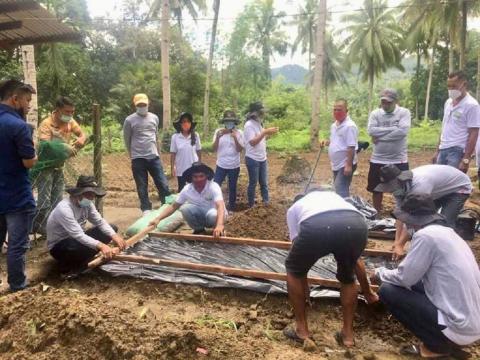Participants from the Climate Resiliency Farm Business School (CRFBS) prepare their vegetable garden plot. While waiting for the harvest season, farmers are also doing gardening to maximise their time at the same time it could be a source of food and income to them.
The Climate Resiliency Farm Business School (CRFBS) is a new extension modality that aims to work with farmers to help them build knowledge and skills to make their farms more profitable and resilient amidst the unpredictable effects of climate change. This training course integrates the concept of farming as a business, good agricultural practices and risk-proofing their livelihood against weather events. This program takes the school to the farmers having Farmer Field School (FFS), Climate-Smart Farmer Field School (CSFFS) and Farm Business School (FBS) in one forum.
The training aims to enhance the farmers’ knowledge, skills and attitude in rice farming and marketing techniques that can help them increase profitability and preserve the environment. Specifically, the training would be able to let the participants learn how to assess vulnerability and agro-environmental risks to small-scale farmer businesses thru understanding sustainability and climate change as a risk; relate the climate smart agriculture; identify opportunities for resilience-building in business planning and development; integrate climate resiliency practices in the FBS approach; and they learned about the ASEAN Economic Community.
Four batches of CRFBS are being conducted in the four provinces of Bohol, Cebu, Negros Oriental and Siquijor, simultaneously. The CRFBS in Negros Oriental concluded on 5 November 2021 while the CRFBS in Cebu concluded on 10 November 2021. Completion for the other two remaining provinces is also fast approaching.
25 farmers from Guihulngan City, Negros Oriental and 20 farmers from Pinamungajan, Cebu were able to complete the 4-month training. The success of the said activity was through the strong coordination and collaboration between the ATI Central Visayas and the local government units.
In Negros Oriental, Allimar Amaat and Jenifer E. Isaac from the Office of the City Agriculturist - Guihulngan City, Negros Oriental; and Amelia B. Sibla from Office of the Provincial Agriculturist - Negros Oriental shared their expertise.
In Cebu, Arnel Navarro from ATI Central Visayas; Joseph E. Dela Cerna from the Office of the Provincial Agriculture; Lorelie Marie R. Caingles and Gemar N. Pefanio from Municipal Agriculture Office in Pinamungajan, Cebu shared their expertise.
“Through the CRFBS, I have learned additional knowledge about (rice) farming. Our farm is actually a business, and not just about our consumption. We can make profit by selling to be used for the farm expenses. We can also buy for our other needs from the profit,” said Gina H. Bacordo in Negros Oriental – one of the training participants. Further, Apolonia Sabagala from Cebu – one of the training participants too said, “I am very thankful to ATI for the additional learnings. I am going to share my learnings to my neighbors so they can also improve their farming system.”

